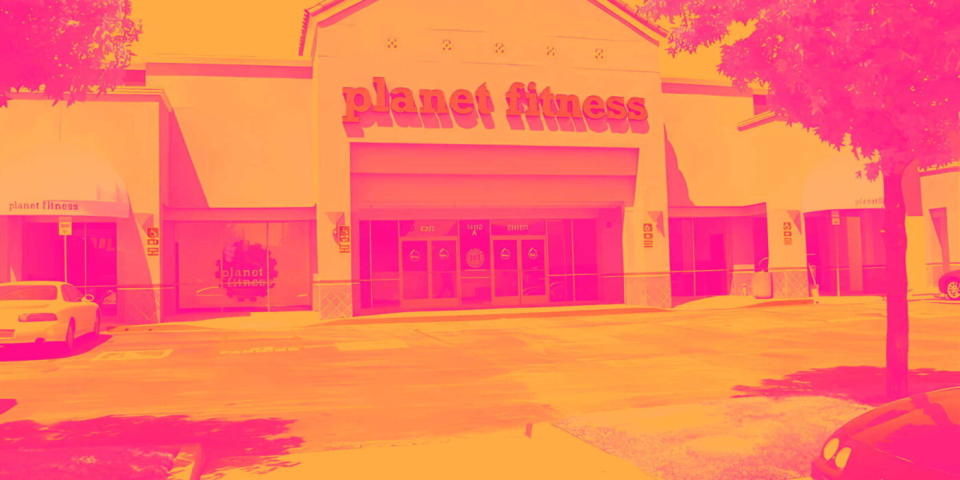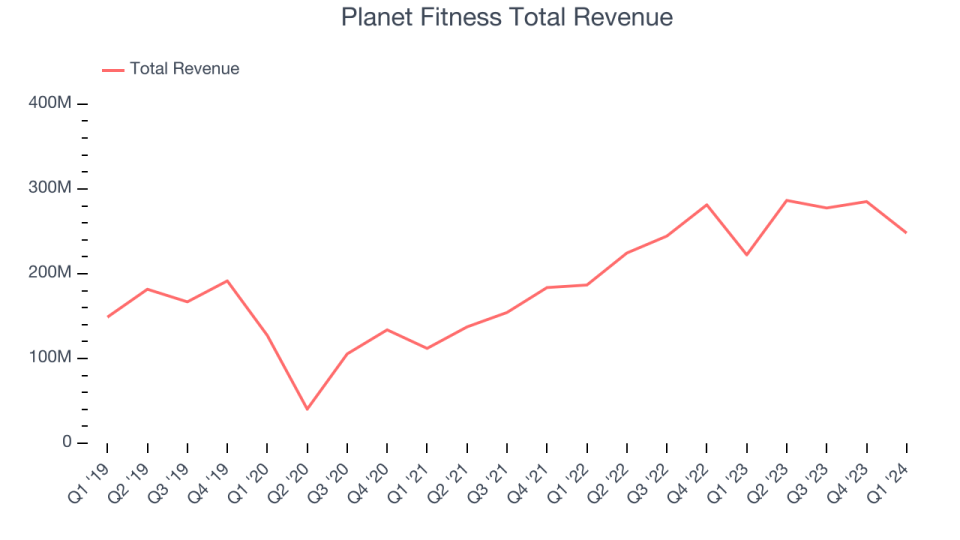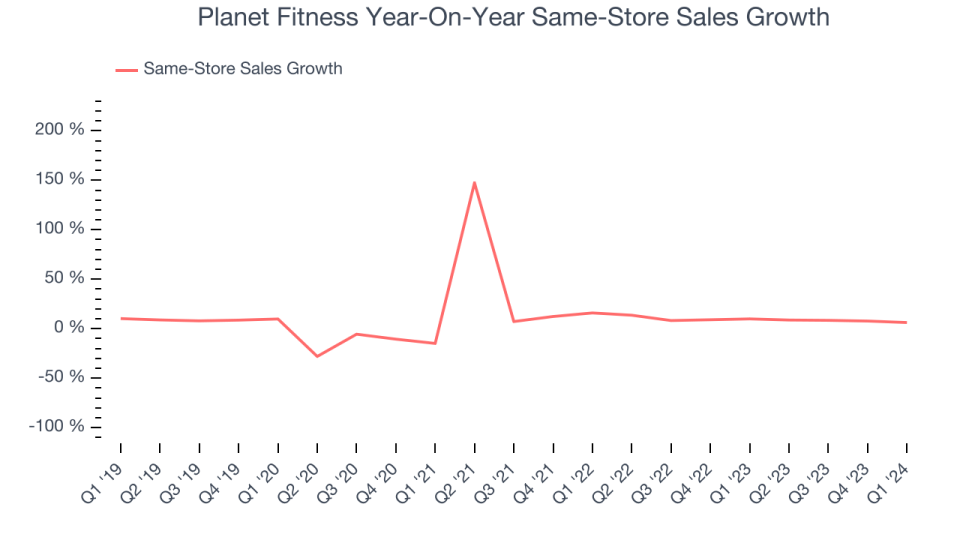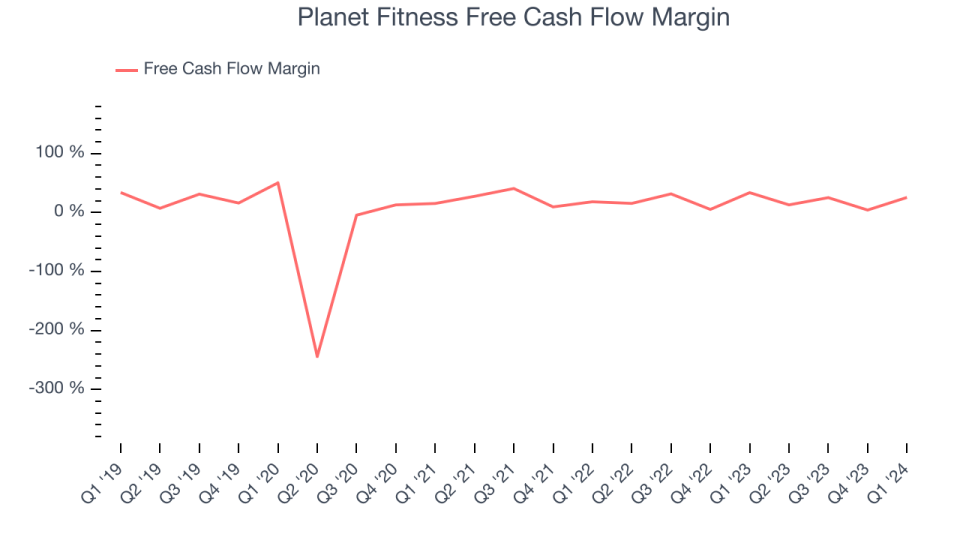Revenue In Line With Expectations But Stock Drops

Inclusive gym franchise company (NYSE:PLNT) reported results in line with analysts’ expectations in Q1 CY2024, with revenue up 11.6% year on year to $248 million. It made a non-GAAP profit of $0.53 per share, improving from its profit of $0.25 per share in the same quarter last year.
Is now the time to buy Planet Fitness? Find out in our full research report.
Planet Fitness (PLNT) Q1 CY2024 Highlights:
-
Revenue: $248 million vs analyst estimates of $248.6 million (small miss)
-
EPS (non-GAAP): $0.53 vs analyst estimates of $0.50 (5.2% beat)
-
Lowers full year guidance for same-store sales and revenue growth
-
Gross Margin (GAAP): 62.4%, up from 61.6% in the same quarter last year
-
Free Cash Flow of $63.42 million, up from $11.98 million in the previous quarter
-
Same-Store Sales were up 6.2% year on year
-
Market Capitalization: $5.39 billion
“Planet Fitness ended the first quarter with approximately 19.6 million members and system-wide same store sales growth of 6.2 percent primarily driven by new member growth. During the quarter, we faced several headwinds which impacted our results including a shift in consumer focus in the New Year to savings and concern over the increase in COVID infections and other illnesses, as well as a national advertising campaign that we believe may not have resonated as broadly as we had anticipated. As a result of these and other factors, we are lowering our outlook for the full year,” said Craig Benson, Interim Chief Executive Officer.
Founded by two brothers who purchased a struggling gym, Planet Fitness (NYSE:PLNT) is a gym franchise which caters to casual fitness users by providing a friendly and inclusive atmosphere.
Leisure Facilities
Leisure facilities companies often sell experiences rather than tangible products, and in the last decade-plus, consumers have slowly shifted their spending from “things” to “experiences”. Leisure facilities seek to benefit but must innovate to do so because of the industry’s high competition and capital intensity.
Sales Growth
A company’s long-term performance can indicate its business quality. Any business can enjoy short-lived success, but best-in-class ones sustain growth over many years. Planet Fitness’s annualized revenue growth rate of 12.8% over the last five years was mediocre for a consumer discretionary business.

Within consumer discretionary, product cycles are short and revenue can be hit-driven due to rapidly changing trends. That’s why we also follow short-term performance. Planet Fitness’s annualized revenue growth of 28.8% over the last two years is above its five-year trend, suggesting some bright spots.
We can better understand the company’s revenue dynamics by analyzing its same-store sales, which show how much revenue its established locations generate. Over the last two years, Planet Fitness’s same-store sales averaged 9% year-on-year growth. Because this number is lower than its revenue growth, we can see the opening of new locations is boosting the company’s top-line performance.

This quarter, Planet Fitness’s year-on-year revenue growth clocked in at 11.6%, and its $248 million of revenue was line with Wall Street’s estimates. Looking ahead, Wall Street expects sales to grow 7.8% over the next 12 months, a deceleration from this quarter.
Unless you’ve been living under a rock, it should be obvious by now that generative AI is going to have a huge impact on how large corporations do business. While Nvidia and AMD are trading close to all-time highs, we prefer a lesser-known (but still profitable) semiconductor stock benefitting from the rise of AI. Click here to access our free report on our favorite semiconductor growth story.
Cash Is King
Although earnings are undoubtedly valuable for assessing company performance, we believe cash is king because you can’t use accounting profits to pay the bills.
Over the last two years, Planet Fitness has shown strong cash profitability, giving it an edge over its competitors and the option to reinvest or return capital to investors while keeping cash on hand for emergencies. The company’s free cash flow margin has averaged 18.6%, quite impressive for a consumer discretionary business.

Planet Fitness’s free cash flow came in at $63.42 million in Q1, equivalent to a 25.6% margin and down 15.3% year on year.
Key Takeaways from Planet Fitness’s Q1 Results
The quarter itself was fine, but the company lowered its full year guidance for same store sales and revenue growth. As a result of that worse outlook, the stock is down 8.6% after reporting, trading at $56.56 per share.
So should you invest in Planet Fitness right now? When making that decision, it’s important to consider its valuation, business qualities, as well as what has happened in the latest quarter. We cover that in our actionable full research report which you can read here, it’s free.

